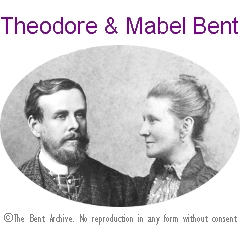
“We cannot too much admire the persistence, courage, and cheerful endurance of hardships displayed by Mr. Bent and his plucky wife.” – The Manchester Guardian
“Mrs. Bent has compiled a work rich in information. Much is included of extreme utility. The volume with its good maps and illustrations and instructive appendices, will deservedly take its place in the category of recognized and authoritative books of travel.” – The World
“May we hope for more.” – The Outlook
In anyone’s list of the best twenty books in the English language on explorations in the Middle East you are likely to find Mabel and Theodore Bent’s Southern Arabia, published in London on 26 January 1900.
This ambitious work, compiled by Mabel from her ‘Chronicles‘ and the notebooks and articles published by Theodore before his untimely death in May 1897, a few days after returning from Aden, now commands high prices for its first edition, handsome as it is with its red cloth binding, sketches by Theodore, Mabel’s photographs, and numerous maps.
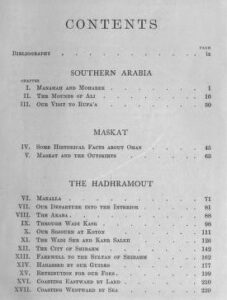
The book would have cost you 18 shillings, quite a sum in those days, over £40 now. However, you will need to find over £500, or as much as £1500, for a good original copy today (March 2021). On-demand editions, thankfully, are easy to find and there are also excellent, highly-recommended (and free) online versions (e.g. archive.org), and the Table of Contents is reproduced here from one.
The region absorbed Theodore Bent for the last few years of his short life and it is thus unsurprising that Mabel spent the next ten years or so, the first decade of the twentieth century, returning for lengthy stays in Palestine, making Jerusalem her base. It has to be said that these sojourns were challenging for Mrs Bent – she had no partner, she became involved in intrigue and controversy, she tried her hand at bookselling, at caring for Gordon’s spurious Garden Tomb (editing a guidebook to it in the 1920s); and there was the episode of her ride alone in the wilderness and her fall and broken leg, and then there is the mystery of the so-called Bethel Seal. And much must be seen within the context of her formative years – a difficult father, the painful death of her mother, the assumed suicide of her younger brother, the early death from typhoid of her elder brother… the need to be somewhere else can be well understood.
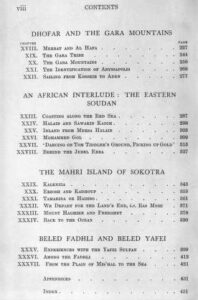
Strangest of all, was Mabel’s obsession – for such it seems – with the controversial movement, British Israelism, and she used her months in Jerusalem to research and write that tract of nonsense she published in 1908 under the title Anglo-Saxons from Palestine. However the book serves two good purposes, one is to illustrate just how absurd the concept was, and is, and the other is to provide, of all things, fourteen pages of reviews of her 1900 publication – Southern Arabia.
Next time you publish, try asking your editor if you can include fourteen pages of reviews of your last book, and a book on someone else’s list to boot! See what answer you get! But you are not Mabel Bent of course – she was something of an unmovable force, much respected for her courage and ‘pluck’, in mountains and deserts, and on horse, donkey, and camel.
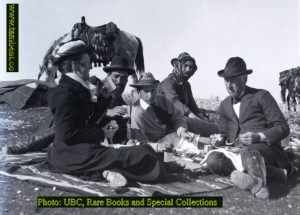
Much of this is evident in what amounts to Mabel’s scrapbook of press cuttings on Southern Arabia, which we present for you via the link below. It is unlikely that they will have been read much since their publication. They are Mabel’s own selection, and she has judiciously edited them for negative remarks – a stinker (‘Man’, Vol. 1, 1901, 29-30) presumably by Arabist D. G. Hogarth, understandably, is not included, but he may well have had a pen in a couple of the others!
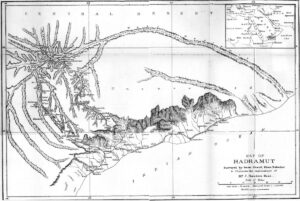
Reading them, with their focus on Aden, Bahrain, Yemen, Dhofar, Oman, Muscat, Sokotra, the Red Sea, etc., you could just as well switch the geography to the Eastern Mediterranean, Egypt, Africa, Iran, the western seaboard of India, or Iran – those other theatres of exploration engaging the Bents for twenty years. And not lost on you, with the sense that Mabel is underscoring each, will be all the old adjectives of Empire – the review from the Illustrated London News is, well, illustrative: “That lady’s high spirit and courage, the tact and cleverness with which she managed to bear her position, as the only female traveller must have been a great help to her conjugal partner. This book is her memorial of him and will be acceptable to many readers.”

But no excuses are needed for drawing these lost glimpses of the Bents to your attention (the bibliographical references are incomplete, let us know if you want any specifically and we will try and help) – the notices will have reminded Mabel, of course, of her dead husband, and their fulfilled twenty years of adventures together, and, like all travel-addicts, her need to be somewhere else…
The lost reviews of ‘Southern Arabia’ by Mabel and Theodore Bent
“The vivacity of her feminine humour, the keen observation of amusing little details, the lively recollection of droll anecdotes, and the brave wife’s spirit of comradeship in their frequent adventurous travels, grace with a peculiar charm the instructive revelation of much rare fresh learning which concerns the lore of historic antiquity, as well as the present condition of territories yet imperfectly known… That lady’s courage and high spirit, the tact and cleverness with which she managed to bear her position as the only female traveller, must have been a great help to her conjugal partner. This book is her memorial of him, acceptable to many readers who condole with her irreparable bereavement.” (The Illustrated London News, April 21, 1900, p. 556)
 Leave a comment or contact us about this article
Leave a comment or contact us about this article